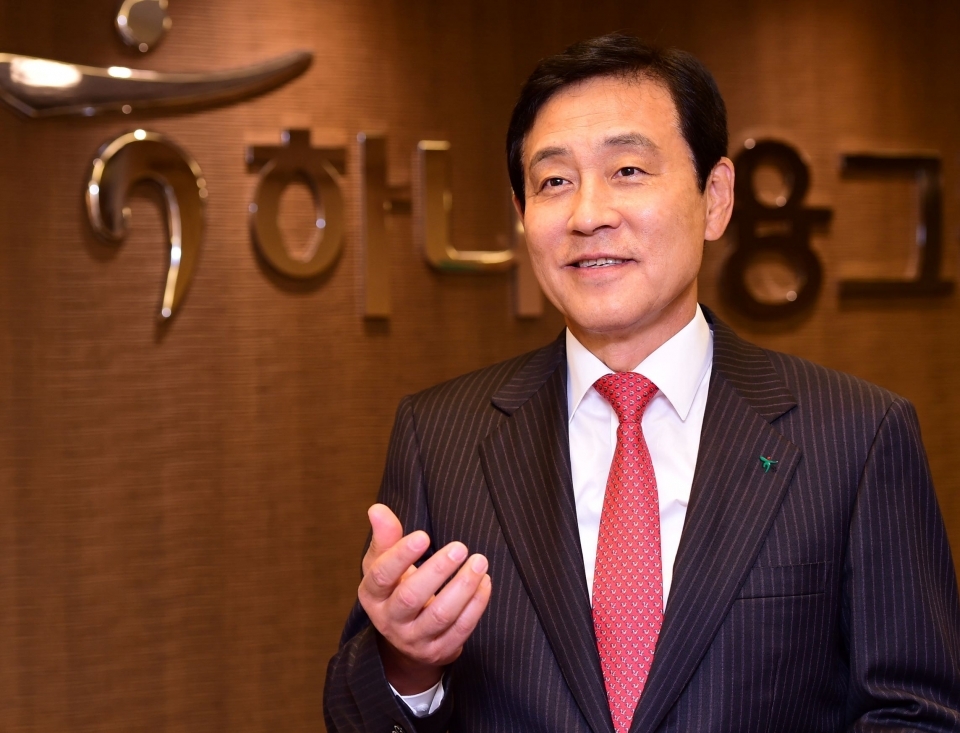[Top Bankers] What South Korea’s longest-serving bank chief faces in 2021
Kim Jung-tai tasked with smooth succession, digitalization, overseas expansion in his final year at Hana
By Jung Min-kyungPublished : March 21, 2021 - 14:29

This is a part of series of interviews and analysis of South Korea’s top bankers, policymakers and investors leading the financial industry here. This is the second installment. -- Ed.
Despite COVID-19 woes that swept across South Korea’s financial sector, 2020 seemed like a milestone year for Hana Financial Group Chairman Kim Jung-tai.
The 69-year-old was named as one of the highest earning banking group leaders here -- earning an annual salary of 2.6 billion won ($2.2 million) last year alone -- and was handpicked by the company’s board to lead Hana, the third-largest financial group here, for another year. Not only that, under Kim’s wings, Hana’s annual net profit gained 10 percent on-year to 2.6 trillion won last year, despite being under pressure from the pandemic.
While Kim himself was more than ready to step down after the end of his third term this year, insiders say his fourth-term nomination was largely expected. Kim’s board nomination to enter his fourth term would be finalized in the upcoming shareholders meeting scheduled later this month. He is slated to step down in March 2022 -- as company bylaw demands its chairman to step down at the age of 70 -- after marking a decade of leadership at Hana.
“With the current situation surrounding Hana’s initial succession plans, Kim was expected to lead another year,” a Hana official told The Korea Herald.
Prospective candidates who were handpicked by Kim have been dealing with either legal issues or accusations by watchdog Financial Supervisory Service.
The FSS last month requested that the prosecution investigate Lee Jin-guk, the head of Hana Financial Investment and the vice chairman of Hana Financial Group, for violating the Capital Market Act, after accusations of prior trading were raised against him.
Another prospective candidate, Hana Financial Group Vice Chairman Ham Young-joo, is meanwhile accused of hiring irregularities and improper selling of derivatives-linked products.
“But we have faith in Kim to resolve the complications surrounding the succession issue, since he is famous for making good and subjective judgements about people due to his ‘people-centered management’,” the official added, pointing to the chairman’s penchant for remembering names and active interactions with employees.
Besides succession issues, digitalization, expansion of the firm’s ASEAN businesses and adoption of ESG values are apparently the key tasks on the agenda before his final term ends in March 2022.
The coronavirus pandemic has accelerated the financial sector’s digitalization as fintech firms such as Naver and Kakao have been aggressively claiming their territories in it. The launch of the nation’s third internet-only bank slated for this year is likely to heat up the competition in the market, in addition to the two thriving online-only lenders Kakao Bank and K Bank.
Hana, alongside other major banking groups, must find a way to survive amid the fast-paced digitalization process. To navigate their way through, Kim in the beginning of the year, vowed to build a comprehensive digital finance platform.
“Such platform is like a marketplace where suppliers and consumers meet and we must build a daily platform by partnering with various lifestyle platforms,” Kim said in his New Year’s speech.
As its first step towards building the platform, Hana began to integrate digital values in its hiring criteria and leadership performance evaluations.
Hana recently hired a digital finance expert as its new outside director. It appointed Kwon Sook-kyo, managing director of Woori FIS, Woori Financial Group’s financial information technology solutions unit, to the position.
Kim also recently added environmental, social and governance and digital platform factors to the company’s key performance indicators, which is used as a yardstick to measure its units’ CEO performances.
Alongside digitalization, further expansion of its business in the ASEAN and other Asian markets is likely to be a top agenda, with vaccine hopes slowly clearing the travel hurdles set up by the pandemic.
Hana has long been pursuing a goal of becoming one of the 40 top global finance groups.

According to local reports, it has been seeking to launch an asset management unit in Singapore. It reportedly plans to acquire a Singapore-based asset manager and is currently at the stage of applying for approval from the financial authorities there.
Hana aims to receive permission by the end of the year, the reports said, and with the important role the Singapore unit is projected to take in the group’s global expansion plans in the future, Kim is likely to give his full attention.
Regarding the ASEAN market, the incumbent Hana chief faces decisions on whether to maintain or downsize its Myanmar businesses. The military coup to seize control of the country in February has forced Korean businesses there to either temporarily shut down or operate at a minimum level.
The group’s microfinancing unit Hana Capital currently operates a business in Myanmar and its flagship banking unit Hana Bank has an office in Yangon as well.
Hana Capital invested 45.5 billion won in its Myanmar businesses last year, indicating Kim had high hopes of making it one of its core overseas projects.
Now, the businesses are operating at a minimum due to the “situation” there, a Hana Financial Group official told The Korea Herald on Wednesday.
Hana currently operates in 24 foreign countries and its profit from overseas businesses is the largest among major banking groups here. As of end-December, Hana posted roughly 540 billion won in net profit from overseas operations.
Kim’s drive to expand its overseas businesses is likely to continue as Hana formed an unprecedented partnership with Shinhan Financial Group last year to cooperate in their global expansion. The chairman previously set a goal of expanding its overseas business net profit pie to 40 percent of the firm’s entire revenue by 2025.
On top of Kim’s goals of overseas expansion, adopting ESG values in both office culture and its investments is expected to add to his approaching decadelong legacy as Hana chairman.
Earlier this week, Hana kicked off an eco-friendly campaign to encourage its employees and customers to use tumblers instead of plastic cups. It previously distributed free tumblers to its employees at Hana Bank.
This follows the firm’s earlier vows made on March 10 to achieve carbon neutrality by 2050. It pledged to halt loans and financing towards coal power plants from now on and strengthen monitoring of any projects that may pose a risk towards the environment or human rights.
Bolstering ESG-integrated management values was one of the strategy pillars Kim announced at the beginning of the year, alongside digitalization and stronger risk management. Kim will likely establish rules and foundations tied to ESG values throughout 2021.
Kim’s career at Hana started in 1981, when he entered Seoul Bank, which later became Hana Bank in 1992. He is viewed as one of Hana’s founding members and served as CEO of the bank in 2008, when the global financial crisis swept through the nation’s financial sector. He was lauded at the time for his risk-management capabilities.
Kim later became Hana Financial Group chairman in 2012.
By Jung Min-kyung (mkjung@heraldcorp.com)


















![[KH Explains] Hyundai's full hybrid edge to pay off amid slow transition to pure EVs](http://res.heraldm.com/phpwas/restmb_idxmake.php?idx=652&simg=/content/image/2024/04/18/20240418050645_0.jpg&u=20240419100350)

